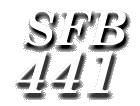
Project B3:
Modal verbs and modality in German
|
||
|
||
|
||
|
Head
|
Prof. Dr. Veronika Ehrich Deutsches Seminar University of Tübingen Wilhelmstraße 50 72072 Tübingen Germany |
Prof. Dr. Marga Reis Deutsches Seminar University of Tübingen Wilhelmstraße 50 72072 Tübingen Germany |
|
Phone: +49/7071/29-74272 Fax: +49/7071/29-5321 Email: Veronika.Ehrich@uni-tuebingen.de |
Phone: +49/7071/29-76741 Fax: +49/7071/29-5321 Email: mer@uni-tuebingen.de |
Project Team
|
Katrin Axel email: katrin.axel@uni-tuebingen.de |
Serge Doitchinov email: serge@uni-tuebingen.de |
|
Daniel Holl email: daniel.holl@uni-tuebingen.de |
Sergej N. Kulakow email: sergej.n.kulakow@gmx.de |
|
Reimar Müller email: MuellerR@gmx.de |
Aim of the project
The central concern of this project are modal verbs as members of a homogeneous form/function class in the German language. With respect to form, modal verbs belong to a homogeneous class because they all show 'preterite-present' inflection in their morphology and because they all trigger coherent infinitival constructions in the syntax. Second, inasmuch as they are means of expressing possibility and necessity in circumstantial as well as epistemic and evidential interpretations, they also belong to a homogeneous meaning class.
The aim of the project is to systematically reconstruct the relationship between the formal and functional characteristics of the class of modal verbs. To this end, it is necessary to identify the place of modal verbs within the overall system of types of modal expressions and to compare them with the competing modality lexemes on the one hand and with further triggers of coherent infinitival constructions on the other. The point of departure for these comparative investigations is the hypothesis that the formal and functional characteristics of the class of modal verbs are systematically related (convergence hypothesis).
The subject matter of the project will be approached in a systematic, descriptive spirit. Sizable data bases of different kinds (introspective data, corpus data from Present Day German and historical texts as well as data from language acquisition) will be used to test the convergence hypothesis. Thus, the project contributes to the overriding concern of SFB 441, which is to investigate the relationship between data and theory in linguistics, by comparing and evaluating the status of different types of data constituting the linguistic facts a theory has to account for.
Further details can be found in our project proposal (2002-2004) (.ps-file oder .pdf-file in German), or have a look at our list of publications.
Cooperations
A1: with respect to
the problem of coherent constructions from a corpus
perspective
A2:
with respect to the theory of data structures; shared
interest also in the evidential meaning of verbs of
perception
A3: with respect to
the problem of introspective data
B2: with respect to
sentence modality, negation and related work on
epistemic modality
B6: with respect to diachronic
lexical semantics and aspects of grammaticalisation
B9 and
B10: with respect
to future, subjunctive and tense forms of modal verbs at
the interface between temporality and modality
Last modified 23 August 2004 by Serge Doitchinov.
